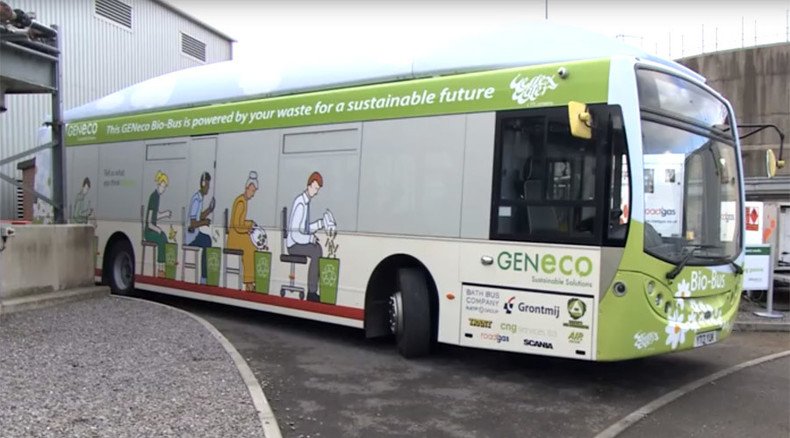Mind the gas: Poo-powered bus fleet expanded in Bristol

Bristol is hoping to launch up to 130 new ‘poo buses’ in coming years following the success of its trial bio-bus. The eco-friendly vehicles are powered by treated sewage and inedible food waste.
First West of England intends to bring 110 of the buses to the streets of Bristol, while Wessex Bus aims to run a 20-strong fleet in the city.
Both companies have submitted applications to the Office for Low Emission Vehicles for grants to support the plans.
Bristol was the first city in the UK to launch a bio-bus last November, which runs on biomethene gas produced when human waste products are treated through a process called anaerobic digestion.
The vehicle can travel up to 185 miles (300 km) on a single tank of gas; or the equivalent of five people’s annual waste products.
The technology behind the poo-bus was developed by waste energy firm GENeco, a subsidiary of utility company Wessex Water.
First West of England is working with councils in South Gloucestershire, Bristol, Bath, North East Somerset and North Somerset to bring its fleet of double-decker bio-buses to the region.
If successful in putting 110 poo-buses on the road, 40 percent of First West of England’s whole fleet will be low emission.
RAW: Revolutionary solar plane takes off on its hazardous Pacific Ocean cross https://t.co/HnadqBMbOIpic.twitter.com/Hc342JnkS6
— RT UK (@RTUKnews) June 29, 2015“This is a great opportunity to increase the number of gas-powered buses on the streets of Bristol and surrounding area, which will significantly improve air quality,” Wessex Bus commercial director Antony Goozee said.
“We believe this would be the most sustainably fueled fleet in the UK, as it will be the only fleet where the buses are powered by the treatment of sewage and inedible food waste from the local community.”
Each bus will have a significantly lower carbon footprint than a typical diesel bus, according to GENeco managing director Mohammed Saddiq.
“Our plans are for the buses to run in areas of Bristol and Bath that have the poorest air quality. It would significantly cut emissions harmful to human health and because the buses will run on gas from renewable sources, it means each gas bus would have an 80 percent less carbon footprint than a typical diesel bus,” he said.
Facebook to test its 1st solar-powered Boeing-737-sized drone that gives free internet access http://t.co/foPgP0QU5Gpic.twitter.com/148hKe5KuB
— RT UK (@RTUKnews) July 31, 2015First West of England general manager Jenny MacLeod said she hoped the plans would pave the way for a “fully sustainable transport network.”
“If we are successful, we will be leading the way in creating a fully sustainable public transport network that can really make a difference to people in and around Bristol. All 110 double-decker bio-buses will operate in Bristol, representing almost half the fleet. It will revolutionize the entire public transport network in Bristol.”
Bristol is well known for its eco credentials. The city was named European Green Capital of 2015 by the European Commission in acknowledgement of its innovative approaches to urban sustainability.












